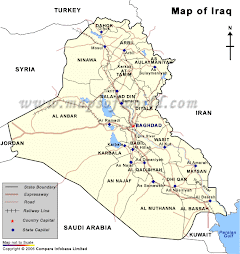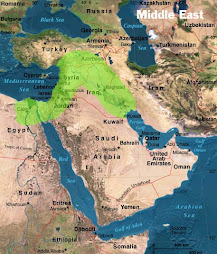Report# 105
BUSINESS AND POLITICS IN THE MUSLIM WORLD
Fertile Crescent
Aisha Rehman
From 29th January – 5th February 2010
Presentation: 10th February, 2010
Summary
Egypt
Political front:
Protestors called on the People’s Assembly to take decisive action against sectarian acts of violence at a protest held outside parliament. “Egypt is for all Egyptians” the roughly 50 protestors chanted while holding up photographs of Abanop Kamal, one of six Coptic young men shot dead outside a church in Upper Egypt’s Nagaa Hammadi on Coptic Christmas eve, Jan. 6. The National Committee Against Sectarian Violence, which organized the protest, was formed three days before the Nagaa Hammadi shootings. Since its formation the National Committee has been campaigning for legislative and social reform to end religious discrimination against Egypt’s Christian minority. Secretary General of the National Council for Human Rights in Egypt Mokhles Kotb stressed that the Council has no objection to the presence of international monitoring and supervision of both Parliamentary and Presidential elections in Egypt scheduled for later this year and 2011, respectively. But he said this monitoring must be done through United Nations organizations and regional organizations.Geo strategic front:
Egyptian police shot dead a sub-Saharan African migrant and wounded another as they tried to enter Israel illegally, a security official said. A police patrol spotted the two trying to slip into Israel north of the Karm Abu Salem border crossing late. "Police opened fire after they refused orders" to stop, the Egyptian official said. The identity of the dead migrant was not immediately known. Hamas' exiled leader Khaled Meshaal said that a reconciliation deal with rival Palestinian faction Fatah was "within reach" and called on Egypt to host a meeting to seal an accord. Egypt has already twice postponed the planned signing of a reconciliation agreement in Cairo because of deep divisions between the Islamist movement Hamas and the secular Fatah. Hamas took control of the Gaza Strip from Fatah after deadly clashes in June 2007, a year after winning Palestinian legislative elections.
Social front:
Female students at Cairo University are defying religious and state efforts to ban the controversial niqab from schools and colleges, saying that wearing the controversial face veil is a religious obligation that also protects against sexual harassment. "I wear the niqab essentially to avoid harassment on the street and on public transport," said law student Marwa Mohammed, 19, her eyes visible only through the slits in the black veil that covers her entire face. But if conditions changed and she was not subjected to harassment would she take it off? She would not, because "the veil gives me respect, and people look at me differently." She implied that sexual harassment would exist as long as young men looking for work and housing remained frustrated in their efforts. "What will change? The battle between the Ministry of Higher Education and university students over the niqab has entered a new phase following last week's Supreme Administrative Court ruling that university administrations could not ban female students from wearing the niqab during exams. In a six-page judgement the court said that "banning the niqab, the full face veil, has no legal bases and contradicts the personal freedoms guaranteed by the constitution." Minister of Higher Education Hani Hilal said in a press conference that his ministry respects the court decision and will implement it.
Iraq
Political front:
Iraq's Shi'ite-led government said a decision by an appeals panel to suspend a ban on candidates with alleged ties to Saddam Hussein's outlawed Ba'ath Party until after an election was illegal. Political wrangling is heating up ahead of the March vote, seen as a crucial test for Iraq as it emerges from years of conflict unleashed by the 2003 U.S. invasion and tries to make peace between once-dominant Sunnis and the Shi'ite majority.
Economic front:Iraq harvested less rice this year than any other year before. The slump agricultural officials blame on falling water levels from the Euphrates River which has for decades supplied the rice fields in southern Iraq. The Twin Rivers, the Euphrates and Tigris, are now a trickle of what they used to be, turning the land between them from a vast breadbasket into desert. A statement by the ministry of agriculture said only 102,000 tons have been shipped to state silos so far and the deadline for deliveries expires by the end of January. Last year, Iraqi farmers ferried more than 120,000 tons of rice to government silos. Iraq currently imports about 10 times as much rice as it produces – that is about 1 million tons a year.
Lebanon
Political front:
Lebanese Forces leader Samir Geagea stressed the significance of a massive turnout to mark the fifth anniversary of the assassination of former PM Rafik Hariri. "It is essential to exert every effort toward the success of the Feb. 14 anniversary and to stress that March 14 will carry on until it achieves the last goal of the Martyrs of the Cedar Revolution,"Geagea said during a meeting of the LF in Maarab. The Libyan government has announced that it hasn't been officially notified about a lower level of Lebanese representation at the Arab League summit in Libya next month. Government spokesman Mohammed Baayo told pan-Arab daily Asharq al-Awsat that Libya was keen on making the summit a success. French President Nicolas Sarkozy's envoy to Syria Philippe Marini said that the situation in Lebanon has gone back to normal. "The situation in Lebanon was among the topics that we have discussed," Marini said following talks with Syrian President Bashar Assad. Israeli Prime Minister Benjamin Netanyahu accused Lebanon of allowing Hizbullah to develop its military force by smuggling weapons "in violation" of U.N. Security Council Resolution 1701. "We are worried about developments in Lebanon and the great flow of weapons, rockets and missiles in blatant violation of Resolution 1701," Netanyahu told a press conference alongside his Italian counterpart, Silvio Berlusconi. "Hizbullah is in the Lebanese government and is developing a military force under the government," said Netanyahu. "These weapons are without doubt aimed at Israeli civilians," said Netanyahu. "It is the responsibility of the Lebanese government to prevent attacks against Israel and its citizens." Berlusconi said he would raise the Israeli concerns Social front:In an attempt to defuse mounting tension sparked followed accusations that Grand Mufti Sheikh Mohammed Rashid Qabbani was involved in financial mismanagement at Dar al-Fatwa, Prime Minister Saad Hariri and Lebanon's former PMs agreed to stop leaks to the media on the country's highest Sunni religious authority. Hariri on Thursday brought ex-premiers Salim Hoss, Omar Karami, Najib Miqati and Fouad Saniora together in a meeting to address the row over Dar al-Fatwa.
PalestinePeace process
The rival Fateh and Hamas movements managed to form a committee that would be in charge of discussing field issues that are preventing reconciliation. The committee was formed after Fateh official Nabil Shaath met with Ismail Haniyya of Hamas and several Hamas leaders in Gaza. The meeting is the first of its kind conducted by a Fateh official to the Gaza Strip since June of 2007. The Hamas movement decided to halt the indirect prisoner-swap talks with Israel in the aftermath of the assassination of Mahmoud al-Madbouh who was killed at a hotel in Dubai two nearly weeks ago. Hamas claims Israeli agents were behind the assassination. Ayman Taha, a senior political leader of Hamas, stated that indirect talks were fully halted, and that they can not resume under the current circumstances. Palestinian President, hinted on Monday that he might accept holding indirect peace talks with Israel, mediated by US Envoy, George Mitchell. He added that direct talks cannot resume before Israel freezes settlement activities for three months. His statements regarding the three months freeze are considered a backtrack on a previous demand that Israel should fully halt its settlement activities before peace talks are resumed. Israeli Prime Minister, Benjamin Netanyahu, stated that there is a chance that the stalled peace process would be unconditionally resumed in the coming few weeks. etanyahu said that the “International community now realizes that Israel wants to resume the peace process”, and that the “road is clear for resuming the talks”. The statements of Netanyahu came during his closing speech at the annual Herzilia conference. He said that “fate of the Jewish people is connected with the fate of the state of Israel”, and added that there is “a need to strengthen Israel’s security capabilities”. Israel’s Defense Minister, Ehud Barak, met with Egyptian president Hosni Mubarak and senior Egyptian officials in Egypt. Barak also met with his Egyptian counterpart, Mohammad Tantawi and Egyptian intelligence minister, Omar Suleiman. Israeli Ynet News reported that the meeting focused on stalled Israeli-Palestinian peace talks, and efforts to release the captured Israeli soldier, Gilad Shalit. Israeli officials accompanying Barak reported the meetings to be positive and productive. It has been one year since Israel launched its 22-day long attack codenamed Operation Cast Lead (OCL) on the Gaza Strip. Last week a British court issued an arrest warrant for Israeli Kadima opposition leader Tzipi Livni for her role in orchestrating the assault. Livni, who was Israel’s foreign minister at the time, was scheduled to visit the UK but ended up calling off her trip; the arrest warrant was cancelled as a result. However the issuing of the warrant in and of itself is an incredible feat. It is also a direct result of recommendations made in the Goldstone Report concerning how to bring justice to the Palestinian victims of OCL. Israel launched OCL in what it said was response to years of rocket and mortar fire emanating from armed Palestinian groups operating in the Strip, invoking self-defense under Article 51 of the United Nations Charter as justification for the attack.
Geo strategic front:
Israeli Defense Minister, Ehud Barak, warned, of the possibility of military confrontations with Syria due to the lack of progress during indirect talks with the country, and added that such an issue could develop into a comprehensive war. Speaking to senior military commanders, Barak stated that a conformation with Damascus would lead Israel to holding talks on the same issues indirectly discussed with Syria fifteen years ago. Hamas has rejected accusations leveled against the movement that it had committed "war crimes" during the last year Israeli offensive against the Gaza Strip. A UN Human Rights Council report that was compiled by a team led by the South African judge Richard Goldstone has accused both Israel and Hamas of war crimes during the three week war in the region.





About the rice production in Iraq, so what? They live in a desert and imported rice is far cheaper, even when there is enough water in the Tigris. In any case, there have been very good rains over the past few months in Iraq and, importantly, upstream in Turkey and Syria. Water should be much less of an issue this year.
ReplyDelete